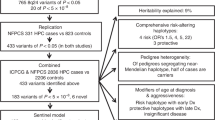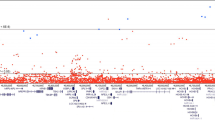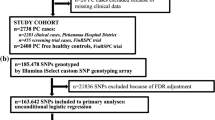Abstract
Prostate cancer has been known to run in families for about 40 years and epidemiological studies have demonstrated an increased risk to close relatives of cases. This risk rises markedly when the closeness and number of cases in a cluster increases. There has been considerable debate about the genetic model, in particular whether there is a commoner lower penetrance (moderately increased risk of the disease due to the gene(s)) in addition to contribution from high risk genes. For the first time, molecular results are starting to emerge, indicating the location of high risk genes. These have shown that there is evidence for more than one site of a high risk, gene two sites on chromosome 1 and one on chromosome X. These do not account for all clusters of prostate cancer cases and further genes remain to be discovered. This article also outlines the contribution of the numerous collaborators in the British Prostate Group to the UK Familial Prostate Cancer Study.
This is a preview of subscription content, access via your institution
Access options
Subscribe to this journal
Receive 4 print issues and online access
$259.00 per year
only $64.75 per issue
Buy this article
- Purchase on Springer Link
- Instant access to full article PDF
Prices may be subject to local taxes which are calculated during checkout
Similar content being viewed by others
Author information
Authors and Affiliations
Consortia
Rights and permissions
About this article
Cite this article
Eeles, R., the UK Familial Prostate Study Co-ordinating Group. & the CRC/BPG UK Familial Prostate Cancer Study Collaborators. Genetic predisposition to prostate cancer. Prostate Cancer Prostatic Dis 2, 9–15 (1999). https://doi.org/10.1038/sj.pcan.4500279
Received:
Accepted:
Published:
Issue Date:
DOI: https://doi.org/10.1038/sj.pcan.4500279
Keywords
This article is cited by
-
Genetic predisposition to prostate cancer: an update
Familial Cancer (2022)
-
Germline polymorphisms associated with impaired survival outcomes and somatic tumor alterations in advanced prostate cancer
Prostate Cancer and Prostatic Diseases (2020)
-
Germline variants in IL4, MGMT and AKT1 are associated with prostate cancer-specific mortality: An analysis of 12,082 prostate cancer cases
Prostate Cancer and Prostatic Diseases (2018)
-
Personalized prostate cancer screening among men with high risk genetic predisposition- study protocol for a prospective cohort study
BMC Cancer (2014)
-
The role of BRCA1 and BRCA2 in prostate cancer
Asian Journal of Andrology (2012)



